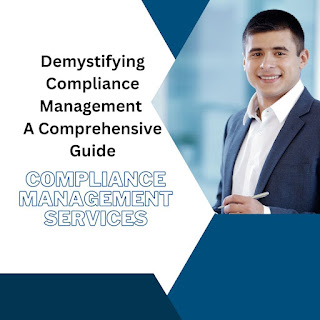Demystifying Compliance Management: A Comprehensive Guide
Demystifying Compliance Management: A Comprehensive Guide

compliance management services in gujarat
Key components of compliance management
typically include:
Regulatory
Awareness: Organizations must stay informed about the various
laws and regulations that apply to their industry and operations. This involves
monitoring changes in regulations and understanding how they may impact the
business.
Policy
Development: Developing and implementing internal policies and
procedures that align with legal requirements and ethical standards. These
policies serve as guidelines for employees to follow in their day-to-day
activities.
Risk
Assessment: Identifying potential compliance risks and
vulnerabilities within the organization. This involves evaluating processes,
systems, and activities to determine where non-compliance may occur.
Training
and Education: Providing training programs and educational
resources to employees to ensure they understand their compliance
responsibilities and the importance of adhering to regulations.
Monitoring
and Auditing: Regularly reviewing and assessing compliance with
internal policies and external regulations. Audits and assessments help
identify and address compliance gaps and issues.
Reporting
and Documentation: Maintaining accurate records of compliance
activities, including audit findings, corrective actions, and any instances of
non-compliance. Reporting to relevant authorities may also be necessary in
certain cases.
Enforcement
and Remediation: Taking corrective actions when non-compliance is
identified, which may include disciplinary measures for employees who violate
policies or regulations. Implementing measures to prevent future non-compliance
is also essential.
Continuous
Improvement: Compliance management is an ongoing process that always
requires continuous improvement. Organizations must adapt to changes in
regulations, industry standards, and business operations.
Effective compliance management helps organizations
maintain their reputation, avoid legal penalties, and build trust with
stakeholders, including customers, investors, and regulators. It is especially
critical in heavily regulated industries such as finance, healthcare, and
pharmaceuticals, but it is relevant to any organization that wants to operate
responsibly and within the boundaries of the law.
Hire Leading Compliance Management Firm In
Vadodara Gujarat - Youhrmanager
.png)
.png)
Comments
Post a Comment